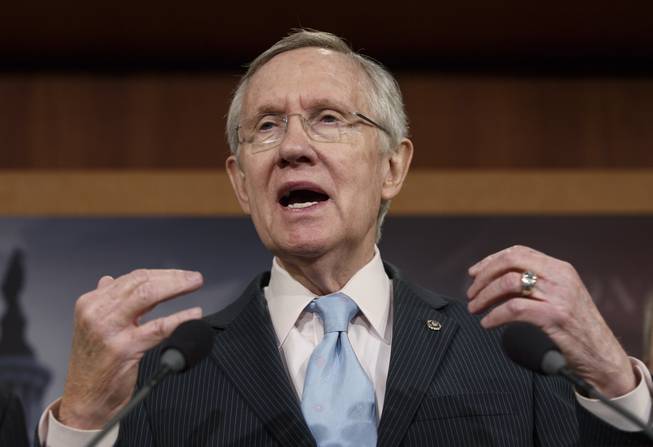
J. Scott Applewhite / AP
Senate Majority Leader Harry Reid, D-Nev., tells reporters that Republicans are thwarting Democratic efforts pass a bill to extend unemployment benefits which expired at the end of last year, at the Capitol in Washington, Thursday, Feb. 6, 2014.
Friday, May 23, 2014 | 2 a.m.
In Congress, the smoke-filled, back-room deal trading is gone. So is the more benign equivalent, the earmark.
Nevada’s delegation is split about whether that’s a good thing and one bill that passed Congress this week shows why.
Nevada lawmakers managed to get a major $280-million flood management project for the Reno and Sparks area authorized as one of 34 projects in a water infrastructure bill Congress approved this week.
The process took a lot more work in today’s post-earmark era, where members of Congress can no longer quietly slip pet projects into legislation without consulting anyone. Nevada’s share of the water bill, for example, took a decade of lobbying from the most powerful person in the Senate, Nevada’s Harry Reid.
Here’s a look at what it took Nevada to get its $280 million project through Congress:
The way it used to be
Today’s process is much different than in 2007, the last time Congress passed this water infrastructure bill. Then, earmarks were king.
Critics say pork-barrel spending, as earmarking was known, resulted in lawmakers trading votes for projects and created a bloated bill filled with unnecessary and expensive projects. In 2007, lawmakers passed a massive, $23-billion water infrastructure bill that was panned as a porkfest. This year’s bill came in at nearly half the size, $12 billion. In Washington, funding water infrastructure became a quintessential example of everything that was wrong with earmarking.
So, earmarks were banned
In 2010, Republicans took control of the House of Representatives, promising to end earmarking, which they did with the support of President Barack Obama.
But that meant lawmakers had to hand power over to federal agencies to decide what goes into public project bills. Reid vehemently opposed ending earmarks, telling reporters earlier this month “it is wrong to have bureaucrats downtown make decisions in Nevada that I can make better than they can make.” But he eventually bowed to political pressure and put a moratorium on earmarks in the Senate, too.
That means it takes more work to get projects approved.
Now, when lawmakers want to secure funding for a big project, they have to wait for a federal agency to independently approve the project.
For Nevada’s Truckee Meadows flood control project, the Army Corps of Engineers relied heavily on local input before making its decisions on projects. That meant supporters in Reno and Sparks had to hire a professional advocate to win over the agency. It was a tough sell: They almost didn’t get the project approved.
“It takes a lot of commitment from the local sponsors to get these projects pushed through,” said Jay Aldean, the director of the Truckee River Flood Management Authority.
Congress has to work harder, too
The new, convoluted process hurts states like Nevada that don’t always have the resources to lobby the federal government, argues Rep. Dina Titus, a Democrat who represents Las Vegas and helped get the project approved.
“I have always supported earmarks,” at least for public infrastructure projects, she said. “Especially when you’re from a state with a small delegation. That’s the only way you can really get some resources back home to your district.”
But Rep. Mark Amodei, a Republican who represents the Reno-Sparks area, disagrees. The transparency of the new process outweighs all the hard work, he said.
“Anytime you don’t have transparency … people are going to always be absolutely free to speculate on how it got done,” he said. “And especially at a time when trust in the federal government is where it’s at, it’s like, transparency is a good thing.”
So what’s going to happen next?
House Republicans praised the water infrastructure bill as a successful experiment.
“It is bipartisan proof we don’t need earmarks to address the people’s priorities,” House Speaker John Boehner, R-Ohio, said in a statement.
But in the Senate, Reid has said he’s sure it’s only a matter of time before earmarks come back. After all, that’s the way things have been done for more than 200 years in Washington.
Even without earmarks, Nevada seems to have gotten what it wanted this time. The question is, can they do it again next time?

Join the Discussion:
Check this out for a full explanation of our conversion to the LiveFyre commenting system and instructions on how to sign up for an account.
Full comments policy